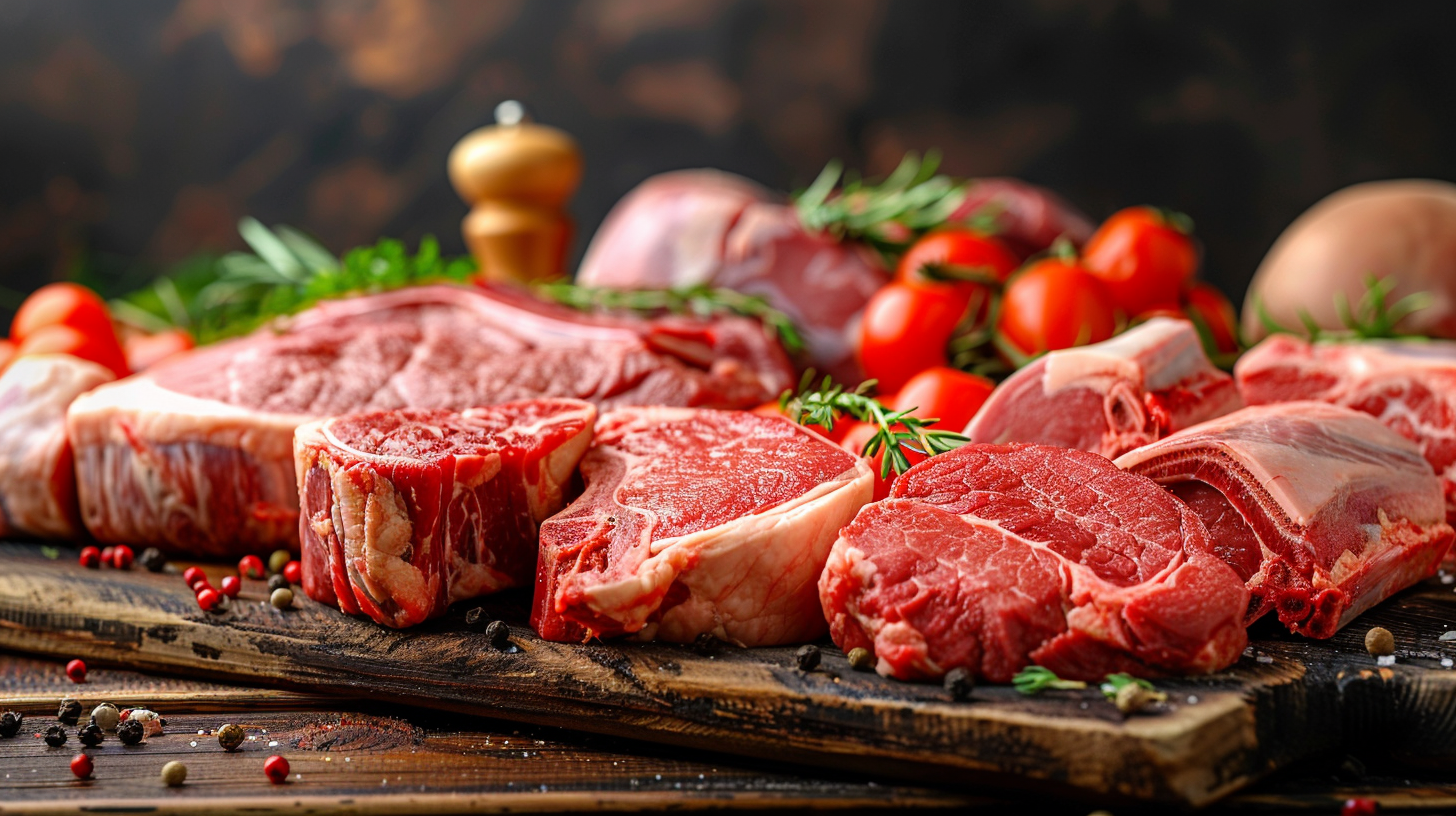If you’re curious about the latest buzz in the world of diet trends, look no further than the Carnivore Diet. Have you ever wondered what it entails? Well, let us enlighten you. The Carnivore Diet is a unique way of eating that focuses solely on animal-based foods. Yes, you heard that right – no vegetables, fruits, or carbohydrates. In this ultimate guide, we will walk you through everything you need to know about this unconventional diet, from its supposed health benefits to potential risks and how to navigate the world of carnivorous consumption. So buckle up and get ready to learn all about the fascinating Carnivore Diet. The Carnivore Diet is a dietary approach that involves consuming only animal products and excludes all plant-based foods. It emphasizes eating meat, eggs, and certain animal-based fats while avoiding carbohydrates, fruits, vegetables, and other plant sources. The Carnivore Diet is based on the belief that humans evolved to primarily consume animal products and that it can lead to various health benefits. While the diet may seem extreme to some, proponents argue that it can promote weight loss, improve mental clarity, increase energy levels, reduce inflammation, and regulate blood sugar levels.
Benefits of the Carnivore Diet:

Weight Loss
One of the primary benefits claimed by followers of the Carnivore Diet is weight loss. By eliminating carbohydrates and relying solely on animal-based foods, the body transitions into a state of ketosis, where it burns fat for energy instead of glucose. This metabolic state is believed to help individuals shed excess body fat and promote weight loss. Additionally, the high protein and fat content in the diet can help increase satiety and reduce cravings, making it easier to maintain a calorie deficit and achieve weight loss goals.
Improved Mental Clarity
Many individuals report enhanced mental clarity and improved focus when following the Carnivore Diet. Some believe that by eliminating carbohydrates and relying on fat as the primary source of fuel, the brain functions more efficiently. The absence of potential food sensitivities from plants may also play a role in reducing brain fog and improving mental performance.
Increased Energy Levels
The Carnivore Diet is often associated with increased energy levels. By relying on fat and protein as sources of energy instead of carbohydrates, some individuals report sustained energy throughout the day without the typical energy crashes associated with consuming high amounts of sugar and processed foods. The diet may also help with the regulation of blood sugar levels, leading to more stable energy levels throughout the day.
Reduced Inflammation
Inflammation is a normal immune response, but chronic inflammation has been linked to various health conditions, such as heart disease, arthritis, and autoimmune disorders. The Carnivore Diet eliminates many potentially inflammatory foods, such as processed carbohydrates and vegetable oils. By focusing on whole foods, particularly high-quality animal products, the diet may help reduce inflammation in the body and alleviate symptoms associated with inflammatory conditions.
Regulated Blood Sugar Levels
The Carnivore Diet can be beneficial for individuals who struggle with regulating their blood sugar levels. By eliminating carbohydrates, which are broken down into glucose and can cause spikes in blood sugar levels, the diet may help promote more stable blood sugar levels. This can have positive effects on overall health, particularly for individuals with diabetes or insulin resistance.
What to Eat on the Carnivore Diet:
Animal Protein
Animal protein is a cornerstone of the Carnivore Diet. It includes all types of meat, such as beef, pork, lamb, poultry, and fish. The quality of the protein is essential, so opting for pasture-raised, grass-fed, and wild-caught sources is recommended. Protein is a vital macronutrient that supports muscle growth, repair, and maintenance, and it provides essential amino acids necessary for various bodily functions.
Animal Fats
Animal fats are also a significant component of the Carnivore Diet. Fats from sources like beef, pork, poultry, and fish are included to provide energy and nourishment. These fats are rich in essential fatty acids, such as omega-3s, which have anti-inflammatory properties and support brain health. Choosing higher-quality, naturally occurring fats is ideal, such as those found in grass-fed beef or wild-caught salmon.
Bone Broth
Bone broth is a nutritious addition to the Carnivore Diet. It is made by simmering bones and connective tissues, typically from animals like beef or chicken, for an extended period. The resulting broth is rich in collagen, gelatin, and minerals, which can support joint health, gut health, and overall well-being. Bone broth can be consumed on its own or used as a base for soups or stews.
Eggs
Eggs are a versatile and nutrient-dense food that can be included in the Carnivore Diet. They are an excellent source of protein, healthy fats, vitamins, and minerals. Eggs provide choline, an essential nutrient for brain health, and are also rich in antioxidants such as lutein and zeaxanthin, which support eye health. Opt for pasture-raised or free-range eggs whenever possible to ensure the best nutritional quality.
Organ Meats
Organ meats are highly nutritious and should be included in the Carnivore Diet. Options like the liver, heart, kidneys, and brain are rich in essential vitamins and minerals. They are particularly high in nutrients like vitamin A, B vitamins, iron, and zinc. While organ meats may not be as commonly consumed in modern diets, they were highly valued by ancestral cultures for their health benefits.
Foods to Avoid on the Carnivore Diet:

Plant-Based Foods
The Carnivore Diet strictly eliminates all plant-based foods. This includes fruits, vegetables, grains, legumes, and nuts. The exclusion of these foods is based on the belief that they are not essential for optimal health and can potentially be harmful due to their various antinutrients and potential for causing gut irritations. While some plant-based foods offer nutritional benefits, the diet focuses solely on animal sources.
Processed Foods
Processed foods should be avoided on the Carnivore Diet. This includes processed meats like deli meats, sausages, and hot dogs, as well as packaged snacks, chips, and sugary drinks. These foods are often high in additives, preservatives, and unhealthy fats, and they can have negative effects on overall health. The Carnivore Diet emphasizes whole, unprocessed foods for maximum nutritional benefit.
Sugar and Sweeteners
Sugar and sweeteners are not allowed on the Carnivore Diet. This includes both natural sugars like honey and artificial sweeteners like stevia or erythritol. The diet aims to eliminate all forms of sugar to minimize blood sugar spikes and prevent cravings for sweet foods. By cutting out sugar, the Carnivore Diet promotes a more stable blood sugar level.
Grains and Legumes
Grains and legumes are excluded from the Carnivore Diet. These include foods like wheat, rice, oats, corn, beans, lentils, and peanuts. Grains and legumes are often high in carbohydrates and can cause inflammation and digestive issues for some individuals. By removing these foods from the diet, proponents argue that overall health and digestion can improve.
Dairy Products
Dairy products are generally avoided on the Carnivore Diet, although some individuals may choose to include certain dairy products, such as high-fat cheeses or heavy cream. Dairy can be a source of inflammation and digestive discomfort for some individuals, particularly those who are lactose intolerant or sensitive to dairy proteins. Those who choose to include dairy should opt for full-fat, high-quality, and preferably fermented options.
Potential Risks of the Carnivore Diet:

Nutrient Deficiencies
The primary concern with the Carnivore Diet is the potential for nutrient deficiencies. By excluding plant-based foods, individuals may miss out on essential vitamins, minerals, and fiber commonly found in fruits and vegetables. Key nutrients that may be lacking include vitamin C, fiber, potassium, and phytonutrients. To mitigate this risk, it is crucial to choose a variety of animal products and consider supplementation when necessary.
Lack of Fiber
Fiber is an important component of a healthy diet and is not present in animal products. The Carnivore Diet is low in fiber, which can negatively impact digestive health and contribute to constipation. Individuals following this diet should pay attention to their bowel movements and consider incorporating low-fiber vegetables, such as leafy greens or cruciferous vegetables, to support digestive regularity.
Dependency on Animal Products
The Carnivore Diet relies heavily on animal products as the primary source of nutrition. While animal products can be nutrient-dense, their exclusive reliance on them may raise ethical concerns for some individuals. It is important to consider the environmental impact and animal welfare issues associated with large-scale animal agriculture. Those following the Carnivore Diet should prioritize sourcing from sustainable and ethical suppliers whenever possible.
Potential for Increased Cholesterol Levels
The Carnivore Diet, which is high in animal fats, may raise concerns about cholesterol levels. While some studies suggest that a high-fat diet can lead to elevated cholesterol levels, research on the effects of a carnivorous diet specifically is limited. However, individuals with preexisting conditions such as high cholesterol or heart disease should exercise caution and consult with a healthcare professional before following this diet.
Lack of Long-Term Research
One of the major limitations of the Carnivore Diet is the lack of long-term research on its safety and efficacy. Most studies on low-carbohydrate, high-fat diets have looked at a more moderate approach that includes plant-based foods. The extreme nature of the Carnivore Diet makes it difficult to draw definitive conclusions about its long-term effects on health, making it essential for individuals to approach this diet with caution and monitor their health closely.
Getting Started on the Carnivore Diet:

Consult with a Healthcare Professional
Before starting any new diet or lifestyle change, it is recommended to consult with a healthcare professional, especially if you have any preexisting health conditions or concerns. They can provide personalized advice, help assess the potential benefits and risks, and guide you in making informed decisions about your dietary choices.
Set Realistic Goals
Setting realistic goals is important when starting the Carnivore Diet. Whether your primary aim is weight loss, improved mental clarity, or managing specific health conditions, it is crucial to establish achievable and sustainable goals. This helps maintain motivation and ensures that you approach the diet in a way that is aligned with your individual needs and preferences.
Create a Meal Plan
Creating a meal plan can help simplify the transition to the Carnivore Diet. It allows you to plan your meals and ensure you are getting a variety of animal-based foods to meet your nutritional needs. Focus on incorporating different cuts of meat, organ meats, and eggs to provide a diverse range of nutrients. Additionally, consider incorporating bone broth for added benefits. Experiment with different cooking methods and seasonings to keep your meals enjoyable and satisfying.
Grocery Shopping Tips
When grocery shopping for the Carnivore Diet, prioritize high-quality animal products. Opt for grass-fed, pasture-raised, and wild-caught options whenever possible to ensure maximum nutrient content and minimize exposure to potentially harmful additives or chemicals. Look for local farmers’ markets or trusted suppliers that prioritize sustainable farming practices and animal welfare.
Track Your Progress
To gauge the effectiveness of the Carnivore Diet and understand its impact on your health and well-being, consider tracking your progress. Monitor changes in weight, body measurements, energy levels, mental clarity, and any specific health conditions you may be managing. Keep a food diary to help identify any patterns or adjustments needed to optimize your results.
Sample Meal Plan for the Carnivore Diet:
- Breakfast: Two fried eggs cooked in butter and bacon slices.
- Snack: Beef jerky or pemmican (dried meat and fat mixture).
- Lunch: Grilled steak with a side of bone marrow.
- Snack: Pork rinds or beef liver pate.
- Dinner: Pan-seared salmon with melted butter and a side of steamed shrimp.
- Snack: Hard-boiled eggs or beef bone broth.
Tips for Success on the Carnivore Diet:
Stay Hydrated
Proper hydration is essential when following the Carnivore Diet. Drink an adequate amount of water throughout the day to maintain optimal hydration levels. Hydration helps support digestion, energy levels, and overall well-being. Additionally, consider adding electrolytes, such as sea salt or an electrolyte supplement, to your diet to replenish vital minerals lost through urine and sweat.
Listen to Your Body
Every individual is unique, and what works for one person may not work for another. It is important to listen to your body and pay attention to how it responds to the Carnivore Diet. Monitor your energy levels, digestive function, and overall well-being. If you experience any negative symptoms or discomfort, it may be necessary to adjust your dietary approach to meet your individual needs.
Experiment with Different Cuts of Meat
To prevent dietary monotony, experiment with different cuts of meat and cooking methods. This can help keep meals interesting and enjoyable. Try different types of beef, pork, poultry, and fish, and explore various ways of cooking them, such as grilling, baking, or broiling. This variety can provide a wider range of nutrients and flavors while maintaining the principles of the Carnivore Diet.
Optimize Your Micronutrient Intake
Although the Carnivore Diet focuses on animal-based foods, it is essential to ensure you are getting a variety of nutrients. Incorporate different types of meat, organ meats, and eggs to ensure you are consuming a range of vitamins, minerals, and essential fatty acids. If you are concerned about potential nutrient deficiencies, considering supplementation or regular blood tests can help ensure you are meeting your nutritional needs.
Find Support and Resources
Embarking on any new diet can be challenging, so finding support and resources can be beneficial. Look for online communities, forums, or social media groups that focus on the Carnivore Diet. This can provide a platform to connect with like-minded individuals, share experiences, and gain practical tips and advice. It is also helpful to access reputable resources, such as books, podcasts, or scientific articles, to further educate yourself about the diet.
FAQs about the Carnivore Diet:
Is the Carnivore Diet safe?
The safety of the Carnivore Diet is a subject of debate. While anecdotal evidence suggests that some individuals thrive on this diet, the lack of long-term research and potential nutrient deficiencies raise concerns. It is crucial to approach the diet with caution, consult with a healthcare professional, and listen to your body’s cues.
What is the scientific evidence behind the Carnivore Diet?
The scientific evidence supporting the Carnivore Diet specifically is limited. Most studies exploring low-carbohydrate, high-fat diets incorporate a wider range of macronutrients, including plant-based foods. While some research suggests the potential benefits of these diets, more studies are needed to evaluate the long-term effects and safety of the Carnivore Diet in particular.
Can you gain weight on the Carnivore Diet?
Weight gain is possible on the Carnivore Diet if caloric intake surpasses energy expenditure. While the diet can promote weight loss due to its potential for ketosis and increased satiety, it is essential to be mindful of portion sizes and overall calorie intake. Adequate protein and fat intake should support weight management, but individual factors can influence weight outcomes.
Can the Carnivore Diet cure certain health conditions?
The Carnivore Diet is often promoted as a potential solution for various health conditions, including autoimmune disorders, mental health issues, and gastrointestinal problems. While some individuals have reported improvements, it is important to note that the diet may not work for everyone and should not replace traditional medical treatments. Consult with a healthcare professional for personalized guidance.
How long should I follow the Carnivore Diet?
The duration of following the Carnivore Diet is a personal decision. Some individuals adopt it as a short-term intervention, while others choose to follow it long-term. It is important to monitor your overall health and well-being closely and make adjustments as needed. If you have any concerns or specific health conditions, consult with a healthcare professional for guidance on the appropriate duration.
Conclusion:
The Carnivore Diet is a unique and controversial dietary approach that involves consuming only animal products while excluding all plant-based foods. Although it is an extreme and restrictive diet, proponents argue that it can lead to various health benefits, including weight loss, improved mental clarity, increased energy levels, reduced inflammation, and regulated blood sugar levels. However, there are potential risks associated with the Carnivore Diet, such as nutrient deficiencies, a lack of fiber, dependency on animal products, the potential for increased cholesterol levels, and a lack of long-term research.
When starting the Carnivore Diet, it is important to consult with a healthcare professional, set realistic goals, create a meal plan, and track your progress. Prioritizing high-quality animal products, staying hydrated, listening to your body, experimenting with different cuts of meat, and optimizing your micronutrient intake are key tips for success. Furthermore, it is essential to find support and resources to navigate this unique dietary approach.
Ultimately, the Carnivore Diet may be a viable option for some individuals seeking a radical approach to nutrition. However, caution should be exercised, and individual needs and preferences should be taken into consideration. The decision to follow the Carnivore Diet should be made with careful consideration, and regular monitoring of overall health and well-being is crucial.
